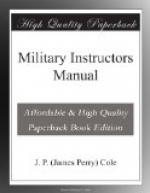10. Never forget that there are 2 sides to every conference—what you plan to give and what you plan to get. You must test the men to see how well they know the work but you must also make sure that every man knows it when he goes out even if he didn’t when he came in.
Study.
The study period usually comes after a full day in the open, and the warm air and artificial light soon make the most ardent soldier doze off into cat-naps. Something must be done to counteract these influences and keep the men on the job. The terror of the next day’s conference will not do it, as that time seems safely distant, with all night ahead.
Assign the men three to five questions on the work to be studied, which will be asked in conference and which require a pretty general knowledge of the subject. Every man will then have a definite objective and a certain minimum of attainment for the evening. Or reverse the process and let each of the class write several questions about what they have studied. The following day let these questions, with the names of the men who asked them, be read before the class and answered. The effect of reading the name of the writer is to insure careful preparation of the question and study of the subject. A good question can hardly be asked without a basis of knowledge, and a foolish question condemns its author.
Another plan is to let the men, whenever possible, instruct the class. Announce that any man may be called upon to take charge, and the uncertainty will keep everyone studying. This plan will also give the men valuable practice in teaching others. Their periods of instruction, of course, must be limited, and unsatisfactory parts of their work reviewed before the conference is dismissed.
Another way to stimulate study is to have a short discussion, talk or quiz just before the close of the study hour, when the men, if left to themselves, will incline to look at their watches more often than at their books. A brief explanation of the work assigned, with emphasis upon a few especially important points, makes good use of this closing time, especially when the men are required to write down the points emphasized.
Syllabus: Small Problems for Infantry.
(References, f.s.r., p. 26-30, 33-39.)
First Problem: Advance Guard and Point:
A. Definition and Function.—Small patrol sent ahead from advance party for disclosing enemy’s position and strength, in time for larger bodies to make suitable defensive and offensive dispositions. Function primarily warning; but to give specific information, it may have to fight and thus feel enemy out.
B. Principles:
1. Formed zig-zag; distance
from advance party =?
2. Controlled by leader of advance party.
3. Speed must be great enough not to impede
the main column.
Must not halt at first sign of enemy, nor
go off on a flank.
4. Interest and co-operation of inferiors,




